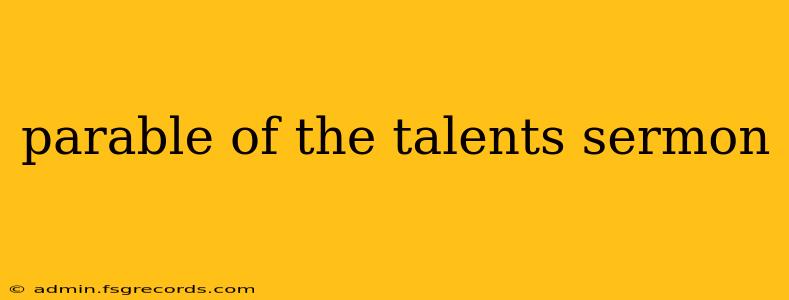The Parable of the Talents, found in Matthew 25:14-30, is more than just a story; it's a powerful call to action, a challenge to examine how we manage the gifts and resources entrusted to us. This sermon will delve into the deeper meanings of this parable, exploring its implications for our lives today.
Understanding the Context: A Master's Departure
The parable begins with a master embarking on a journey, entrusting his possessions—talents, representing abilities and opportunities—to his servants. This isn't simply about money; it's about the varied gifts and potentials God bestows upon each of us. Our talents are not just our inherent skills, but also the opportunities, resources, and influence we possess. Think of your education, your relationships, your time, your health—these are all talents entrusted to your stewardship.
The Three Servants: A Study in Contrasts
The master entrusts his possessions unevenly: five talents to one servant, two to another, and only one to the third. This highlights the diverse ways God equips us. Some of us may have many apparent talents, while others might feel they have fewer. The parable's message, however, transcends the quantity of talents received.
-
The Servant with Five Talents: This servant diligently invests his talents, doubling them through shrewd business acumen. This represents proactive engagement with our gifts, actively seeking opportunities for growth and positive impact. It's about more than simply maintaining what we have; it's about maximizing our potential.
-
The Servant with Two Talents: Similarly, this servant also doubles his talents, demonstrating faithful stewardship, albeit on a smaller scale. This underscores that the reward is not solely based on the magnitude of our talents but on the faithfulness of our efforts.
-
The Servant with One Talent: This servant, out of fear and laziness, buries his talent, returning it unchanged to the master. This represents inaction, a failure to engage with the gifts we've been given. It's a parable of missed opportunities and the consequences of neglecting our responsibilities.
The Master's Return: Accountability and Reward
The master's return signifies judgment and accountability. He doesn't reward based on inherent ability but on the effort and faithfulness demonstrated. The servants who invested their talents, regardless of the initial amount, are praised and rewarded. Their actions show a willingness to take risks, to work hard, and to utilize their abilities for good.
The Consequences of Inaction: A Warning
The servant who buried his talent faces severe consequences. His excuse—"I knew you were a hard man"—reveals not only his fear but also his lack of initiative and trust in his master. This highlights the dangers of complacency and the importance of actively engaging with our lives and responsibilities. This isn't about condemnation; it's a call to action.
Applying the Parable to Our Lives Today
The Parable of the Talents isn't just a historical anecdote; it's a timeless message with profound implications for us today.
Identifying Your Talents: A Personal Inventory
Take some time for self-reflection. What are your talents? What are you good at? What opportunities have you been given? This isn't about boasting; it's about understanding how you can best serve God and others with the gifts you've received.
Investing Your Talents: Putting Faith into Action
Once you've identified your talents, it's crucial to actively invest them. This means stepping outside your comfort zone, taking risks, and using your abilities to make a positive impact on the world. This could be anything from volunteering your time to developing your skills to using your influence to help others.
Accountability and Growth: A Continuous Process
Stewardship is not a one-time event; it's a continuous process. Regularly evaluate how you are using your talents. Are you growing? Are you making a difference? Seek feedback from others and be open to learning and improvement.
Conclusion: A Call to Faithful Stewardship
The Parable of the Talents is a powerful reminder of our responsibility to use our gifts wisely and faithfully. It's a call to action, challenging us to step out of our comfort zones and embrace the opportunities that lie before us. Let us not bury our talents out of fear or laziness, but rather invest them with diligence, faith, and a commitment to serving God and others. May we all be faithful stewards of the blessings we have been given.

